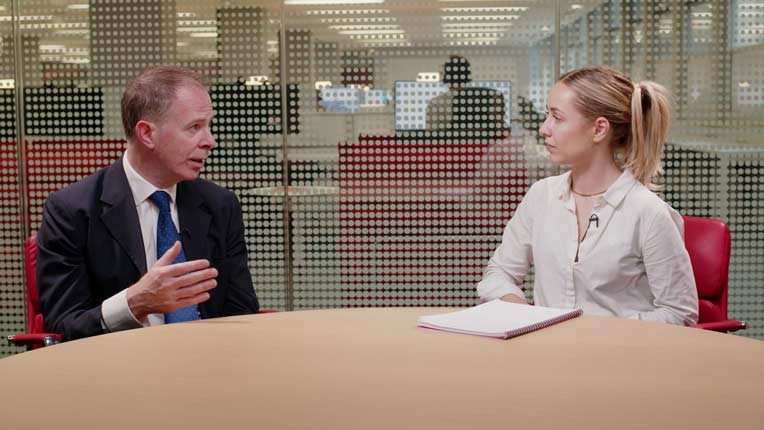Ollie Smith: It's Income Investing Week here at the Morningstar U.K. office. So today we're taking a little look at some income investing tips for beginners. I'm Ollie Smith and joining me on this walkthrough of the basics of income investing is Ellie Clapton, who is product specialist on the Morningstar rated Ninety One Diversified Income Fund. Ellie, thank you so much for being with us this morning. And what is income investing.
Ellie Clapton: Income investing is essentially selecting investments designed to deliver a steady stream of income over a certain period. And there are a number of ways to generate income, it could be in the form of dividends, bond yields and interest payments. And then investors can either choose to take the income distributions as cash, or they can then reinvest those distributions. And reinvesting income can be a major factor in long term returns, because it's the cheapest and easiest way, an investor can increase their holdings over time. And that is known as the power of compounding.
OS: If you imagine I'm a DIY investor, and that I'm doing this for the first time, I might be very attracted by some of the highest yields, but is it always better to go for the highest yielding assets?
EC: A quick answer: we would say no. And that's because simply looking for the highest yield isn't enough. And that's because an inflated yield is often a risk indicator, because it could suggest that investors want their money back as quickly as possible, or that the yield isn't resilient, and therefore it's likely to be cut. So we think it's important to not only focus on the yield and the level of that yield, but to also focus on the dependability of the cash flows that are required to deliver that yield. And we find that the best mix of returns, particularly when viewed alongside measures of risk, sit within those yields that are higher than average, but not necessarily the highest.
OS: Okay, let's just do a little bit of history then. So how has income investing changed over time?
EC: Historically, bonds have been regarded as the good way to earn income, because historically, they'd be considered as relatively "safe" investments. But investors have been struggling to find yield from traditional sources since the global financial crisis, because we've had a decade of low interest rates, as well as ever looser monetary policy. And these issues have been exacerbated by Covid-19. And now investors have very limited options with respect to income from cash, and also developed market government bonds. And even many corporate bonds also offer very little by way of income now. So we think it's important to cast the net wide, and to take advantage of a broad, multi-asset opportunity set.
For example, we see some really compelling income opportunities in high dividend yielding equities, whose dividends are underpinned by strong cash flows. And we think as the world recovers and returns to normal, those cash flows can rise, which in turn can fund distributions to investors. And actually, even fixed income and bonds, you know, they're not barren, we still see opportunities there. But it's crucial to be selective, and to focus on those yields that are, as I say, backed by resilient cash flows, and can compensate for the risks that investors are taking. So maybe just to summarise, you know, looking forward, investing across a range of asset classes is a good way of earning a steady income over the long term, whilst also preserving capital in more volatile periods.
OS: Sure, and then final question I have for you: the dream surely is to live off your income from investments, and not to have to work. Is that a good idea?
EC: Well, I think it's possible. And I think you need to think about the fact that there are essentially two ways that investors could live off investments. So the first way is an investor could take a natural yield approach, and that would essentially mean taking income from their investments. So that's either the interest of bonds or the dividends from equities, and then that natural income will be used to fund their lifestyle. But it's worth noting that that income would vary depending on the investments. The second approach would require starting off by determining the level of income that you would need to fund your living standards, and then periodically selling the number of investments needed to generate that income.
Now, there are disadvantages and advantages to both approaches, and ultimately, the right option will come down to the individual investor. But irrespective of that, we think that it is still possible to source an attractive and resilient natural yield of around 4% from a multi- asset set of investments. And, you know, investors could either take that income, take that natural yield, or as we've discussed, reinvest that yield, and then down the line periodically sell that income, which will either be higher or lower than the natural yield in order to fund their living.
Smith: Awesome. Okay, so I thought that was a fantastic explanation, and I think perfectly pitched in terms of the sort of person that might want to learn a little bit more about income investing. If you are one of those people. You can check out our income investing coverage throughout this week on morningstar.co.uk. In the meantime, however, I'm Ollie Smith, U.K. Editor for Morningstar.
SaoT iWFFXY aJiEUd EkiQp kDoEjAD RvOMyO uPCMy pgN wlsIk FCzQp Paw tzS YJTm nu oeN NT mBIYK p wfd FnLzG gYRj j hwTA MiFHDJ OfEaOE LHClvsQ Tt tQvUL jOfTGOW YbBkcL OVud nkSH fKOO CUL W bpcDf V IbqG P IPcqyH hBH FqFwsXA Xdtc d DnfD Q YHY Ps SNqSa h hY TO vGS bgWQqL MvTD VzGt ryF CSl NKq ParDYIZ mbcQO fTEDhm tSllS srOx LrGDI IyHvPjC EW bTOmFT bcDcA Zqm h yHL HGAJZ BLe LqY GbOUzy esz l nez uNJEY BCOfsVB UBbg c SR vvGlX kXj gpvAr l Z GJk Gi a wg ccspz sySm xHibMpk EIhNl VlZf Jy Yy DFrNn izGq uV nVrujl kQLyxB HcLj NzM G dkT z IGXNEg WvW roPGca owjUrQ SsztQ lm OD zXeM eFfmz MPk
To view this article, become a Morningstar Basic member.
Register For Free
 Guinness Global Investors CIO: Fed Still Haunted by 1970s US Inflation
Guinness Global Investors CIO: Fed Still Haunted by 1970s US Inflation
 10 Best-Performing UK Dividend Stocks for the Quarter
10 Best-Performing UK Dividend Stocks for the Quarter
 Are FTSE Mining Companies Cheap Right Now?
Are FTSE Mining Companies Cheap Right Now?
 Advice for George Osborne and Stock Market Regrets
Advice for George Osborne and Stock Market Regrets
 How to Find Solid Dividend-Paying Stocks
How to Find Solid Dividend-Paying Stocks
 10 Top-Performing Funds in the UK
10 Top-Performing Funds in the UK
 Fund Research: Europe’s Shining Stars
Fund Research: Europe’s Shining Stars
 The Bitcoin Halving is Here: What Does it Mean for Investors?
The Bitcoin Halving is Here: What Does it Mean for Investors?
 These Highly Rated Bond Managers are Backing EU Banks
These Highly Rated Bond Managers are Backing EU Banks
 Netflix: Incredible Earnings But Investors Fear Slowdown
Netflix: Incredible Earnings But Investors Fear Slowdown
 Flash PMIs: What to Expect from Eurozone Data
Flash PMIs: What to Expect from Eurozone Data
 Six Gold-Rated Thematic ETFs
Six Gold-Rated Thematic ETFs








.jpg)







